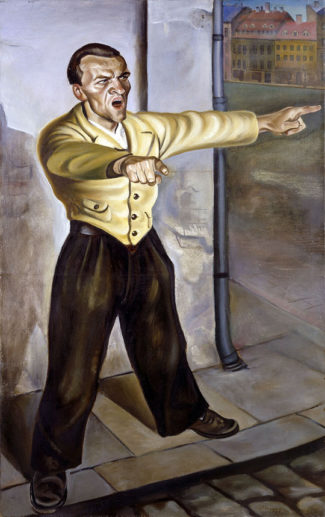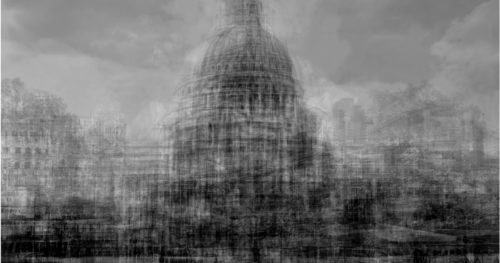
Melvin Way
“It is self-evident that nothing concerning art is self-evident anymore, not its inner life, not its relation to the world, not even its right to exist. The forfeiture of what could be done spontaneously or unproblematically has not been compensated for by the open infinitude of new possibilities that reflection confronts. In many regards, expansion appears as contraction.”
Adorno (Aesthetic Theory)
“In explicitly subverting the masses’ ability to experience truth and pleasure unmediated by centralized authority, fascist propaganda openly expresses the totalitarianism implicit in the true power relations of “late industrial society.” In this regard, it is even more “objectively truthful” than commercial commodity advertisement.”
George Cavalletto
“The satisfaction of one portion [of society]… depends upon the suppression of another.”
Freud (The Future of An Illusion)
“The masculine ideal in our culture, for example, has traditionally been one of almost complete emotional constipation…most men even today are stuck with this choice between articulate and inarticulate zombiehood.”
Philip Slater
The current state of near hysteria about Russian interference in a mythical democracy (the U.S.) is indicative of something Adorno noted when he wrote about the radio addresses of 1930s Los Angeles preacher Martin Luther Thomas. Thomas is mostly now long forgotten, a strange footnote in the seemingly endless stream of odd ball cult leaders, puritanical crusaders, and mystics that are associated with Californian history. But what Adorno noted was that Thomas was substituting human collective ends for pure instrumental means. Thomas promised no end beyond being part of a sort of quasi crusade against Jews and Communists. One one level it is use value being exchanged for exchange value. But it is more than that. As Adorno noted, propaganda becomes the point of propaganda. The Russophobic hysteria one sees today is there to perpetuate a desire (well, first to manufacture a desire) for more propaganda. The only time an end is implied it is a nuclear holocaust. And some (see John Bolton) find this perfectly reasonable. But then Bolton is a very dangerous madman. Mostly it is a crusade to the ‘norm’, the status quo. George Cavaletto has a very sharp chapter in his very good book (Crossing the Psycho Social Divide) on Adorno’s short essay on Thomas and Thomas’ radio addresses. And one of the more cogent observations here is that the replacing of ends for means was a tendency that surfaced at the very beginning of Capitalism. The worker was being forced to see him or herself as a tool. This was ur-alienation.

Andrew Garn, photography.
“First, human beings become means to themselves (“become tools to themselves, to recognize and treat themselves as means rather than as ends”) and then, out of a desperation for meaning, they transpose this sense of self as pure means into an even more radical self-alienation: the “negative sacrfice” of self to the higher cause of fascism.”
George Cavaletto
This marked the beginning of desire for administrative omnipotence rather than belief in any ideology or philosophy. An almost erotic attachment to bureaucratic power and authority. And this is certainly, in several different registers, what one sees in the United States today. The final instrumentalization of human subjectivity. The necessity for the relatively strong ego demanded for competition (however illusory it may have been) gradually gave way to the submission to authority outside the self – a specific form of submission that entailed the destruction of self. The coercion to identify with not just commodity production or even distribution expanded to include mass communication and entertainment — an identification that began to be more with mass communication itself than with any specific film or studio or telecom. It was an identification with the system. Celebrity fetishizing certainly grew, but even there it was increasingly mediated by a perspective akin to that of company manager or CEO. A paradoxical loss of self that still clung tenaciously to a submissive identification with the system that was oppressing and erasing it. The relatively strong ego (autonomous to a degree) changed into ego collapse. The culture that gave such emphasis to ego health and development was one in which the ego was ever shrinking.

Matt Bollinger
But the key point, in a sense, is that the economic — speaking psychologically — gave way to an identification with structure itself. In other words; monopoly control was expressed in structural terms — the perception, if not the complete reality — was with not an elite of ownership but an elite of managed control. Rockefeller became Zuckerberg and Gates. Now this is only perception, but there are material truths embedded in this, too.
Adorno made a set of notes (which remain unpublished) in which he theorizes that Freud’s anthropology was correct for the stage of entrepreneurial capitalism, but it was not correct when applied to later monopoly capitalism. In fact Adorno suggested that post WW2 ushered in a new anthropological type. What Callavetto described as the man of new social functions and new psychic formation. This new psychic formation mirrored the coercions of a new economic order. The new human was a psychic employee who had abandoned any sense of being a self sustaining economic individual — the demand for conformity grew exponentially. Psychic development was delayed, or retarded, and followed a logic born of efficiency and a mental risk averse economy. The psyche began to mirror not the world and Nature, but the economy.

John Heartfield
What is interesting in this is the role of the fascist orator. For in some sense the authority figure of this new epoch was (echoing Reich certainly) was both big and small, weak and powerful. The “little man” was triumphant by virtue of his submission. But his submission was bought through a bargain whose currency was speech — oration. The small man rose up to speak. With this transformation came secondary psychological adjustments. The model of Hitler and Mussolini was being recalibrated to fit with an increasing instrumentalization of daily life. World War 1, as Enzo Traverso noted, was the first industrially planned conflict. The first air war, the first anonymous war. Death from afar. Impersonal. Instrumental. But psychologically the transformation was delayed. The masses must make their oppression their cause. The only defense to madness, in a sense, was to embrace one’s own enslavement.

Rudolph Bergander
“A successful fascist movement is one that takes up into its own authoritarian forms representations of the objective pressures that had previously overwhelmed its members. In such cases, the masses “identify themselves so strongly with the power system [of the organization] that they are ready to undergo any hardship, as proof of the power and virility with which their own humiliation seems to incorporate them.”
George Callavetto (quoting Adorno)
One sees the legacy of this now in extreme sports, or extreme workouts, or all of the countless masochistic practices that advertise themselves as proof of personal growth.
“If no hope of true solidarity is held out to the masses, they may desperately stick to this negative substitute.”
Adorno
There is a psychic reversal (per Callavetto) that takes place in submission to fascist authority. For the illusion of empowerment entails a huge psychological cost. Adorno suggested, somewhat tentatively, that the budding fascist desires his or her own annihilation as much as the annihilation of the enemy. There is a deeply pertinent issue here related to masochism. For Freud this was the failed Oedipal conflict, but however one views that the masochist knows and must repress the inevitable failure of this project — the parental authority of Fate (to use Freud’s description). For masochism is always shadowed by fatalism.

Jordi Alcaraz
What Freud called ‘those most inhibited and deepest desires’ are ones in which a pessimism looms. Adorno noted the mood of Germany prior to WW2. There is an intoxication with failure that pretends to be salvation. This drama is played out, as I noted above, in gyms daily, across the U.S., in which only complete exhaustion and self punishment will suffice. Anything less is not self regulation, or rational self care, but weakness and impotence.
The fascist orator is provoking these same contradictions; but the call for rising up out of weakness is paid for by the denigration of those who fail to meet this call. And this elicits an unconscious arousal. And I have often sensed this in certain artists, Pasolini is one, who for all his very insightful treatment of fascism and fascist sexuality, was himself aroused and drawn to the oration of power and authority. The fascist orator is, then, employing a currency of ambivalence. And there is a gendered aspect to the religious tropes of fascist oration, for the fear is often couched in images of adversaries who threaten rape and forced prostitution for wives and daughters, and hence the collective unifies to fight off this threat while simultaneously enjoying these private narrations, ones close to their own hidden desires.
Adorno noted the fascist leader is habitually looking to expose sin. The uncovering of the licentious and immoral. And this will later form part of the growth of the surveillance state. Fascist oration made technological. Surveillance, as an industry, is the machine Mussolini, as it were.

Bruce Jackson, photography (Cummins Prison Farm, 1967)
“A culture pervaded by ever-present stimuli that call forth sado-masochistic desires to invade and obliterate (as a means to participate vicariously in and identify with) the dirty-dark privacy of others provides not only a mass psychology ready to be exploited by fascist leaders; it is already in itself, insists Adorno, “an attitude closely akin to fascism.”
George Callavetto
And this impulse to uncover dirty secrets drives much of contemporary mass culture. It is always cloaked in garments of virtue, but at its core is a false indignation that is really a wish to be the one uncovered. Mass electronic media, social media, is awash in ambivalent eroticized indignation and outrage. How often does one read or hear the phrase ‘how dare you’!

Jack Lueders-Booth, photography.
Adorno noted that increasingly it doesn’t much matter what is revealed, for the revealing act itself becomes sexual. There is a curious link here to strippers and the purchasing of an act of uncovering sin. And it becomes automatic. It is anticipated (and there is an entire essay to be written on anticipation). The fascist audience welcomes any sordid revelation and accepts it as, if not truth, at least some form of reliable data.
“The fascist-minded listener, at least, is willing to accept without examination any scandal story, even a most stupid one like the ritual murder legend.”
Adorno
The current wave of sexual allegation (in the aftermath of the Weinstein story) is a case in point. These allegations have taken on a ceremonial character. The substitute gratification of ambivalent material is the irrational stand in for real pleasure, a pleasure largely denied to people under advanced capital. Cavalletto notes the corrosive effect of irrational and spurious gratifications. For these are ways to distract from the numbingly repetitive quality of daily life in the West today. The revelations of celebrity gossip, the same as the policing aspect of technological surveillance, both serve to distance the audience from the core emotional trauma of their lives. Trauma which has largely a social character.

Curt Querner
I have noted before that the popularity of ‘behind the scenes’ stories, whether on film sets or in reality TV police shows is one that makes everyone momentarily an insider. Someone *in the know*. Libidinal satisfaction from these glimpses into privileged arenas always leave a psychic hangover. These counterfeit glimpses into a reality denied the viewer in their actual lives is another example of ambivalence. There is a fleeting satisfaction in imagining oneself as a cool insider while at the same time these shows remind the audience of the banality and colorless bland lives of obedience that they lead. The obsessive compulsive use of smart phones is another example of distance from experience. And that distance both allows and then encourages a sadistic lynch mob mentality. Distance and anonymity. Adorno noted that the fascist community is one in which there is no real joy, but only the release of repressed material and frustration, but a frustration merged with others frustrations.
And again, it is more than just this. It is neurotically regressive (Adorno). And it is more than even that, too. For it is a delusional and hallucinatory fantasy, one coupled to ambivalent feelings of betrayal and self loathing. The fascist, racist, and antisemite always blame others, the adversary, for what they themselves desire and/or are. And this is the core (perhaps) of the fascist community and its projections. Or, rather, one core. For there is more than one. This projection mechanism is complex, however. The threat of black teenagers or Jews or Commies bears little relationship to actual black teens or Jews etc. It is more a projection of the self doing the projecting, a self that is disfigured and hence unrecognizable. The need to be unrecognized means that a precursor desire FOR disfigurement is at work. Hence a constant and ongoing process of self disguise takes place. For that CANNOT be ME, that is someone else. I cannot allow myself to see myself. And the constant changing of appearance; new hair color, new haircut, new style of dressing — a new *look*. Fashion itself carries with it an aspect of this ambivalence.
“The new is the longing for the new, not the new itself.”
Adorno

Betty Godwin
The ‘little man’ who speaks! Who is just like you, small and weak, is become powerful through the sound of his voice. Pamphlets cannot do what speech, what the sound of ‘his’ voice can do. For sound symbolically breaks down the walls of a symbolic prison. In fact, real prisons are not surprisingly the loudest places in the world. Convicts must do everything noisily. Even if only banging down domino tiles or cards. Making a noise, making a sound, contains at all times latent rebellion. Or, human sound. The voice. And this is why, possibly, theatre is more disruptive than film, finally.
“Exploitation is not only economic, but cognitive. The factory system injures every one of the human senses, paralyzing the imagination of the worker. His or her work is “sealed off from experience”; — memory is replaced by conditioned response, learning by “drill,” skill by repetition: “practice counts for nothing.”Perception becomes experience only when it connects with sense memories of the past; but for the “protective eye” that wards off impressions,”there is no daydreaming surrender to faraway things.”
Susan Buck Morss
The end of the Cold War, writes Buck Morss, marked the end of a kind of industrial dreamworld. Whether that is strictly true or not, the fall of the Soviet Union certainly marked the wounding of the Western mind. It left an unsterilized and uncauterized wound in the ‘new man’. I wrote last posting of the introduction, via actuarial disciplines, of a new category of human, *the normal*. The normal then is the first majority instrumental psyche. It is the new anthropological type that inhabits advanced monopoly capitalism.

Patterson Ewan
This is a reductive take, but its also not without some merit I think. But it also leads into what one means by *experience*. For experience, as a concept, unavoidably carries the latent spiritual with it. Adorno actually had originally intended to title his book Negative Dialectics, perhaps his most difficult, “A Theory of Spiritual Experience”. (Habermas would have really hated that one). For experience is intimately related to art, as are ideas on the spiritual. And both, it is safe to say, have been eroded under late capitalism. The spiritual then, at least for Adorno, was the object as a potentially immanent universal. One cannot really approach this without realizing *this* universal was not classifacatory universal of positivism (and really, of science). One where an object shares qualities with other objects and they are classified together (short version). What Kant called the determinant judgement. The point is that (per Roger Foster, who is a great reader of Adorno) the structure of spiritual experience is one in which the subject goes in search (!) of a concept, not one in which the subject evaluates the object’s characteristics in order to compare it and classify it with the appropriate already established concept.
“The modern world, for Adorno, is marked primarily by a transformation in the structure of experience, a structure that is reflected in the theoretical self-understandings of that world produced by philosophy. Adorno tends to describe this structure in terms such as “withered” or “restricted” experience.”
Roger Foster

Idris Khan
The concept, then, for Adorno, was always potentially able to disclose more than it said. This gets rather dense, but for the purposes here, what is important is that the concept expresses itself through language. And language is a highly opaque sort of topic, finally. But what IS clear is that art plays a critical role in all this, for in art the experience — if the art is any good — always expresses more than it says. And this is the heart, really, of what there is so much bad art criticism, from both sides of the political spectrum. Art cannot be worth much if it is firstly about ideology. For the ideological implications are discovered in the wake of the spiritual or universal. Roger Foster wrote (a dense half paragraph, but also one that articulates the issues here)….
“The expression of experiential substance in concepts is concerned with the intrinsically historical meanings that are picked up by the concept via relations of contiguity and proximity. This point foregrounds two centrally important features: (1) the experiential substance of concepts must be understood as the historical world; and (2) what a concept expresses is not reducible to the inferential relations it licenses (since what it expresses depends on the concept’s proximity to a historical context). In itscharacter as expression, the concept enters into relations with other meanings by virtue of sharing a historical world.”
Now, why this matters for the topics or ideas of this posting is that spiritual experience is impossible without a cognitive maturity, as it were. Without memory. The object (and the world) lose clarity, and definition the more the subject accepts an idea that subjectivity is *merely* subjective.
There is an important quote (one I know, and one Foster starts a chapter with)….
“Something obscure that is exactly expressed as such has nothing in common with something clear that is obscurely expressed; the first is like …a thunderbolt, the second signifies incompetence. The first is the adequate precision of what is to be said and what can be said (des Auszusagenden und Aussagbaren), it is a fully factual refinement . . . the second is dilettant-like and bombast.”
Ernst Bloch

Norbert Bisky
This is one of those quotes that is itself spiritual in a sense because the implications are so extensive. But it also serves to point up the problem of difficult cultural material. And here Wittgenstein is important. For both Adorno and Wittgenstein sought to examine representations and language from a critique of (per Christopher Demmerling) *linguistic reification*. Wittgenstien, and to a lesser degree Adorno, both saw language and the understanding of it, tied to its usage in the everyday, but also in the history of the everyday. Both thinkers looked to transform the relations of the world by rectifying the way conceptual language is used. Maybe, the way all language is used. Trying to say the unsayable. (* It was a quote of Adorno on this topic that I poached for the title of my book). Anyway, artworks are always, I think, about saying (in whatever medium) the unsayable. And that this is impossible then means that each artwork must be both an autopsy on the death of itself, and in memoriam. Great artists are the priests of failure. But it is a failure that gives birth to transformation. For without this self critique, without the cold formal difficulty of self reflection that allows for some form of artistic resolution, then the work it simply kitsch entertainment or propaganda.
Wittgenstein at the end of Tractatus says that the sentences of his book are like a ladder to be thrown away after making the ascent. Philosophy for Wittgenstein, was a practice. The disenchanted society was one in which subjectivity had been worn down to the place where it only registers that something is taking place — out there — and it is best if I can describe it or classify it, but never will the idea of experiencing it enter the discussion. The reified world discloses, through language as it is used today, the truth of reification, for such disclosure is itself reified. Adorno said this, but in another way. But again, to return to the topic at hand (for this brings us to the precipice of the dialectic and that is, for certain, too big a topic for this posting).
Fascism then is the oration of reification.

Prudence Heward (1928).
“To think conceptually is to identify. This process of identifying particular things as tokens of more general types fixes and stabilizes meanings, rendering them more useful for the purpose of predicting and controlling nature. Adorno believes that this is the basic process behind the process of reification, i.e. the domination of use-values by exchange-values that is characteristic of the commodity form { } On the one hand identity-thinking feeds into and shapes the social world according to the demands of instrumental rationality. On the other, the context of universal fungibility feeds back and forms human thought and action, redefining rationality as a mere calculus for the efficiency of means. The upshot of this is that the very processes which were supposed to liberate human beings from subjugation by external nature rebound upon them and imprison them in a network of technological manipulation and administrative social control.”
James Gordon Finlayson
The shift in the anthropological human is one in which fungibility is internalized and accepted, even sought after. Again, so degraded are social practices that all (well, most, or a lot) cultural product is infused with masochistic content, and significantly, (and this time nearly ALL) is structurally related, very closely, to the structural conditions and contours of masochistic aberration. A psychic retooling in which the horizon for desire is significantly reduced and stunted — a horizon where there is only (to push the metaphor) a very myopic close and restricted gaze. Max Weber somewhere wrote about *salvation anxiety*. And this is linked I think to fascism, too. For the new post modern fascist (the new little man) has not rid him or herself from the residue of Christianity (more on that below).

Frank Horvat, photography. (Pigalle, 1950s).
“You don’t believe that your friend could ever do anything great. You despise yourself in secret, even – no, especially – when you stand on your dignity; and since you despise yourself, you are unable to respect your friend. You can’t bring yourself to believe that anyone you have sat at table with, or shared a house with, is capable of great achievement. That is why all great men have been solitary. It is hard to think in your company, little man. One can only think ‘about’ you, or ‘for your benefit’, not ‘with’ you, for you stifle all big, generous ideas.”
Wilhelm Reich (Listen, Little Man)
Wittgenstein said something else very telling that relates here. Also in the Tractatus.
“One becomes aware of the solution to the problem of life in the dissolution (Verschwinden) of the problem. (Is this not the reason why those to whom the meaning of life becomes clear after a long period of doubt are unable to say what this meaning consists of ).”

Photographer unknown. Singapore 1910 (photochrome)
So normalized has the question become that few even take note that most often it is not a question but an interrogation. And perhaps not even that. It is a statement of privilege. Such as when white people ask black people ‘what can I do to help?’. Or, as Roger Foster noted, questions such as ‘What is the meaning of life?’ Such statements, when addressed aloud to another, are insidious and aggressive. They are always hostile. And they matter in the context here because artworks are gnomic — they are riddles, they do not answer questions. But neither does philosophy. Problems that dissolve (per Foster) are not answered. If artworks are a practice then such notions as fixed meaning has no relevance. Its relevance is found in the commodity form. The meaning of an artwork is outside discussions of purpose, as well.
When a society has lost its own history of social practices then even customs and traditional greetings are half formed. Questions are seen as invasive and appropriate only for uniformed and trained questioners. Lay socializing is shunned subconsciously. Substitute ‘organizational socializing’ offer some alternatives to what used to be part of daily life; but the rituals of 12 Step Programs or social clubs, or recreational group activity (not to mention if they are for youth or children) invariably are built on foundations of religious anti-religiousness. In other words the appearance of the secular is there to reinforce a master narrative of democracy and freedom, while the actual construction of most are rigidly hierarchal and express this air of generalized ecclesiastic power. Ideas like *tough love* are embraced (scared straight, interventions, etc) and applauded for they provide vicariously the desire to be the executioner. Even awards shows (The Oscars, Golden Globes, et al) feel increasingly sacrificial somehow.
“Myth succumbs to enlightenment, while enlightenment inevitably reverts to myth.”
J.M. Bernstein

Alex Colville
What I am calling ‘the new fascist’ is the product of the historical project, a failed project, of internalized sacrifice. In a sense this is another way of expressing the dialectic of Enlightenment, but its not identical, finally.
“It is in poetry that the work of mourning, transforming hetero-affection into auto-affection, produces the maximum of disinterested pleasure”.
Jacques Derrida
Internalized sacrifice. The punishing principle is driven by subconscious intuitions that suggest from the punishment, even the killing, of that we desire that we will then in fact get what we desire. Kill it to later find it, but in a damaged state. For that is the curse of reification, in a sense. In order to have what we desire we must mutilate it before the entire psychoanalytical narrative is internally launched. It is as if desire were a train we had to catch, but fearing the actual ride, we blow up the track, severely damage the train, but accept this as the cost of getting what we want.

William Degouve de Nuncques
But what it is we want? This, increasingly, is the question. For the new anthropological human the problem is a new amputated desire. But here I am guilty perhaps of exactly what I just criticised. For somehow I less and less feel as if such questions have much weight. Not that the topic of desire is not important.
“…for ages there have been places where what is seen is inside: a cell, a sacristy, a crypt, a church, a theater, a study, or a print room.”
Gilles Deleuze
The medieval mind was one keenly aware of interior space. The monastic cell had no window out of which one might gaze in distraction. That modern windows continue to grow (though few can be opened, perhaps a telling architectural trend) is a comment on flight from the interior. Now Freud recognized that sometimes a build up of tension can be pleasurable (The Economic Problem of Masochism, maybe not his best known paper it should be pointed out).

Pieter Bruegel the elder (Christ and the Woman taken in Adultery). 1565.
“Pleasure and unpleasure, therefore, cannot be referred to an increase or decrease of a quantity (which we describe as ‘tension due to stimulus’), although they obviously have a great deal to do with that factor. It appears that they depend, not on this quantitative factor, but on some characteristic of it which we can only describe as a qualitative one. If we were able to say what this qualitative characteristic is, we should be much further advanced in psychology. Perhaps it is the rhythm, the temporal sequence of changes, rises and falls in the quantity of stimulus. We do not know.”
Freud (The Economic Problem of Masochism, 1924)
And it occurs to me that, following for a moment the Freudian model, that this mysterious rhythm or whatever it is, has links to how space and representations of subjectivity have evolved. Freud adds a few lines later…“we must perceive that the Nirvana principle, belonging as it does to the death instinct, has undergone a modification in living organisms through which it has become the pleasure principle.”
For all seems rather relevant in light of the new human and the new aggressive society of hyper alienation. And it is also telling to re-read Marcuse again, and specifically his seminal book on Freud (Eros and Civilization). And in particular his idea of surplus repression…“the restrictions necessitated by social domination. This is distinguished from (basic) repression: the ‘modifications’ of the instincts necessary for the perpetuation of the human race in civilization.” The rise of an open fascism today speaks to the state and corporate propaganda that has looked to rehabilitate fascism and imperialism. But this sense of masculine loss of affect was noted over fifty years ago. The cusp of this transition according to Adorno. But something changed, I think, around thirty years ago. Maybe again in just the last fifteen or twenty. Americans, if that is who we are speaking of, went from orality to purely anal sadistic. Or, maybe, it was a return to anal sadistic. Either way the love of biggness and power has gradually given way to a kind of not just loss of affect but loss of — for lack of a better word, self.

Carol Feuerman
Anality was, of course, critiqued as quintessentially American also over forty years ago with Norman O. Brown (and others, Joel Kovel for one). So, the shift is taking place in another register. And Deleuze and Guattari were certainly not wrong to suggest all production was a kind of desire. And this returns me to this idea of identification with structure. But the problem with Deleuze and Guattari is that they elide the basic premise of Freud which is the desire to return to the unity experienced at the mother’s breast. Of course material forces are the engine behind the tensions of this separation, not something eternally internal, as it were. But I’m not sure Freud would disagree with this, even if Deleuze and Guattari do. In any event, the discounting of Freud today is largely based on this misreading I think.
Capitalism reproduces subjects that are needed to reproduce capitalism. Thats the calculus of advanced capital. Alongside this are the obvious violence and inequality that are parts of this calculus. At some point the origin of our psyche doesn’t matter very much. Except, it does. It does because the psyche increasingly resembles the economy of a crises ridden capitalism as it exists globally, but most acutely in the West.
“Thus, growing wealthy is an end in itself. The goal determining activity of capital can only be that of growing wealthier, i.e. of magnification, of increasing itself.”
David Harvey
Desire is to merge with the logic of Capitalism. To be capital, in a sense. There are so many topics lurking in all this that is hard to know where to begin. But one point bears mentioning and that is the fall out from the McCarthyism of the early 50s and of the Cold War. Because that period privileged a certain American nativism that was pronounced in Academia. And this was the era of Skinner and behaviorists, and while currently many on the left are attacking post structuralism (not without some merit to be sure) it strikes me that the far more pernicious influence came out of the 50s — for this was the moment when history was rendered as useless. An ahistorical science based belief system was the way to go. Marx was seen as a mystic and fraud and Freud was starting to be subsumed totally by adaptive ego adjustment theories. The rest of continental philosophy was just romantic rubbish not fit for the hard edged masculinity of white America. And the changes that have taken place in art, from painting to film to literature reflect this. For what happened was the tepid resistance of liberal American conformity in the arts. The bureacratization of art. This is a bit like what Walter Benn Michaels saw in the ideological uses of diversity. And Thomas Paul Bonfiglio has a great chapter on anglocentrism in his excellent book The Psychopathology of American Capitalism. Diversity came to reinforce exactly that which it purported to want to correct. But these structural reversals are now so common as to be commonplace even. For this is a clear indication that there is a structural coercion that takes place almost automatically today.

Wolfgang Mattheuer
Identification with a system, or worse, with the structural outlines of this system, has narrowed the western gaze to something so small as to be close to disappearing. It is rendering consciousness mostly inert, and occasionally reactive.
“…we like the idea of cultural equality better than we like the idea of economic equality (and we like the idea of culture wars much better than we like the idea of class wars).”
Walter Benn Michaels (2006)
The liberal imagination is now so awash in bad faith and hypocrisy that it has reached a level of parody. Obama was the synthetic manufactured ideal of stealth imperialism, if not stealth fascism. And a profoundly miserable population is incapable of finding their way out of an intellectual maze that mostly is denied to even exist. Substitute issues, alarmist tropes, and fake compassion are the state of discourse today in the West. The culprit is never capitalism, never the system so profoundly identified with. It is always our personal failings. Convenient in an era of utter impersonality. The new anthropological human cannot even rise to the level of his or her Neanderthal ancestors. For they went in search of discovery rather than hiding from it.

Gottscho Schleisner photo. 1948 NYC.
A final note (one that Bonfiglio noted) and that is the affluent classes in the U.S. validate satiric news programs (Colbert, Stewart, Samantha Bee, et al) because such shows defuse tensions. They neutralize anxiety for a populace mostly emotional stultified.
“Humor and satire are very effective methods of relieving tension and sublimating hostile urges. They are, in effect, vehicles for the neutralization of those hostilities. They are not forums for serious political organization. Despite their outrageous carnivalesque satires, they ultimately serve to dissipipate opposition, keep it in a disorganized state, and maintain the status quo.”
Thomas Paul Bonfiglio
Entertainment overall is in the service of sustaining the mass suffering of advanced capital. And the majority product is comedy and satire. The difficult and cultic, the perplexing and sibylline, are met with hostility. Art is now, as I’ve noted before, a bad word. A term of derision. The new Normal Human is only comfortable and secure with aggression, though not his or her own. The masochism of contemporary capital is now subsuming the sadism of the recent past. The results for the vulnerable and most of the global south is the same, however.

Christian Boltanski, photogravures.
A reminder that paypal is available for anyone who wants to donate to this site. Thanks to those who have.

Merci.
I’ve read all of your posts and I think this is the best — I have re-read several times. I want to share it with other people but, alas, reading something like this I become aware of the fact that there are so few Americans who have the internal fortitude & intelligence to dive in … It is a bit upsetting to realise — if every American citizen was FORCED (hahaha) to read this post, very very very few could make heads or tales of it, and most of those who had the requisite reading comprehension would misunderstand it or cry foul when you denigrated the great leader oh-bah-mah (whatever his real story is………….)
I first read this post on the same day that I read this article from Memphis / theater … I lived in that quixotic but fascinating and deeply troubled city for only three years but still trying to git it outta my skin and yet it is both repelling and some kinda badge … every every errrrr-body knew that this long-standing theater figure in M-town had inclinations and predilections & no one could possibly be surprised that he could be caught up in copycat yet small-towny BS… the times we live in! But there is something just so pathetic about this—
https://www.commercialappeal.com/story/news/2018/03/13/jackie-nichols-leaves-playhouse-after-sexual-misconduct-accusations/420884002/
I started highlighting some of your observations to include in this comment, and then I realized I’d highlighted about one third of your entire post. So instead I’ll just say thank you John for so many very thought provoking observations on our modern world and the human condition. I will return to this post again before long. There is much here to contemplate further.
Thank you, as ever – not least for bringing Melvin Way to my knowledge. Incredible drawings.
Thank you for this excellent piece.